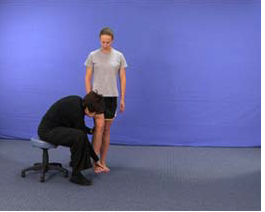AIM:
To train walking by providing assistance
Rationale:
Whole-task training is set up so the patient can practice walking with manual guidance from the therapist.
Equipment:
- Stool on wheels
- Arm sling (if necessary)
Key Points:
- Patient is positioned in standing, feet shoulder-width apart, toes pointing forward, trunk, hips and knees extended
- Therapist is positioned to the side of the patient (preferably on a stool on wheels) to assist walking
- During stance phase, the therapist provides manual guidance to assist hip and knee extension
- During swing phase, the therapist provides manual guidance to assist knee flexion and ankle dorsiflexion
- The first step is taken with the intact leg Ensure patient does not externally rotate hips A second therapist may be required to assist
Common Errors:
- Therapist crosses arms when switching manual guidance between stance and swing phase
- Therapist’s instructions and manual guidance are not synchronized
Progression and Variety:
- Decrease/remove manual guidance
- Increase step length
- Walking in different directions, eg, backwards, sideways

